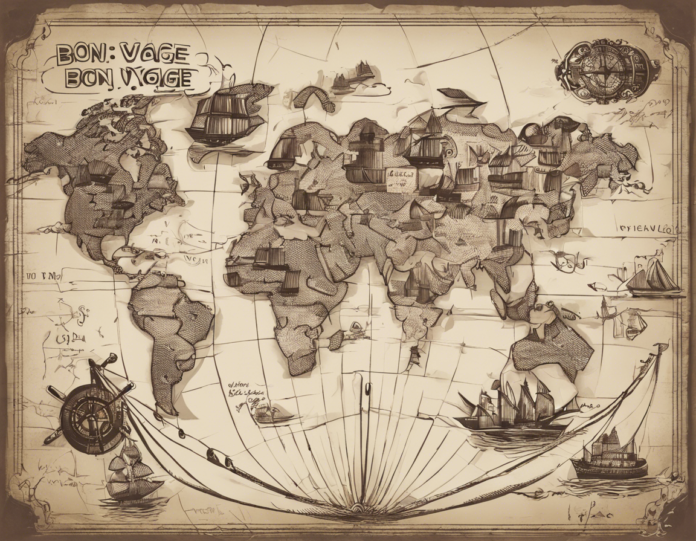Humans have always been fascinated by the idea of venturing into the unknown, whether through physical travel or through life’s various transitions. Bon voyage, a phrase borrowed from the French language, is commonly expressed as a form of good wishes to someone embarking on a journey. In this article, we will delve into the meaning of bon voyage and explore the nuances of farewells and travels.
The Origins of Bon Voyage
The term bon voyage translates to “good journey” or “safe travels” in English. Its usage can be traced back to the 19th century when it became popularized among English speakers as a way to bid farewell to travelers departing on voyages by sea or land. The French language, known for its elegant expressions, often evokes a sense of romance and adventure, which is reflected in the sentiment of bon voyage.
The Significance of Bon Voyage
Saying bon voyage is not merely a customary farewell; it carries a deeper meaning rooted in well-wishes and hopes for a safe and successful journey. It is a gesture of care and consideration for the person setting off into the unknown, acknowledging the uncertainties and challenges that come with travel. By uttering bon voyage, we express our support and optimism for the traveler’s experiences ahead.
Bon Voyage Traditions Around the World
The sentiment of bon voyage transcends national and cultural boundaries, albeit with varying customs and traditions. In many countries, it is customary to give gifts or tokens of good luck to travelers before their departure. For instance, in Japan, travelers often receive omamori, amulets believed to bring protection and good fortune during travels. In Hispanic cultures, it is common to touch the departing person’s luggage to ensure a safe journey.
Farewells and Emotional Transitions
Farewells mark significant moments of transition in our lives. Whether bidding adieu to a loved one embarking on a new chapter or saying goodbye to a place we hold dear, farewells evoke a myriad of emotions. The act of saying bon voyage is a way to navigate these emotions and convey our support for those venturing into the unknown.
Navigating the Emotions of Farewells:
- Sadness: Farewells often evoke feelings of sadness or nostalgia as we come to terms with the changing dynamics of our relationships or environments.
- Excitement: On the flip side, farewells can also spark excitement and anticipation for the adventures and possibilities that lie ahead.
- Gratitude: Expressing gratitude during farewells allows us to reflect on the moments shared and the impact of those we are parting with.
Travel as a Life Experience
Travel, whether for leisure, work, or personal growth, is a transformative experience that broadens our horizons and enriches our perspectives. It exposes us to new cultures, languages, and ways of life, fostering personal growth and self-discovery. Saying bon voyage is not just a gesture; it is an acknowledgment of the profound impact that travel can have on an individual’s life journey.
Benefits of Travel:
- Cultural Awareness: Traveling exposes us to diverse cultures, traditions, and perspectives, fostering cultural empathy and understanding.
- Personal Growth: Stepping out of our comfort zones through travel challenges us to adapt, learn, and grow as individuals.
- Memorable Experiences: Travel creates lasting memories and stories that enrich our lives and relationships.
Frequently Asked Questions (FAQs) about Bon Voyage and Farewells:
1. What is the difference between “bon voyage” and “safe travels”?
– While both phrases convey good wishes for a journey, “bon voyage” is derived from French and is often associated with a more formal or elegant expression compared to “safe travels,” which is straightforward and commonly used in English.
2. Is it appropriate to say “bon voyage” for all types of travels?
– Yes, “bon voyage” can be used for any type of journey, whether it is a vacation, business trip, or a relocation.
3. Are there specific gestures or customs associated with saying “bon voyage”?
– While the act of saying “bon voyage” itself is a gesture of well-wishes, in some cultures, giving gifts or tokens of luck is also common.
4. Can “bon voyage” be used in written communication?
– Yes, “bon voyage” can be used in written forms such as cards, emails, or messages to convey good wishes for someone’s journey.
5. How do you respond to someone wishing you “bon voyage”?
– A simple “thank you” or “I appreciate it” is a courteous way to acknowledge the well-wishes of someone saying “bon voyage.”
In conclusion, the phrase bon voyage encapsulates a world of emotions, hopes, and anticipation as we bid farewell to those embarking on journeys. It serves as a reminder of the power of travel to broaden our horizons and shape our lives. So, the next time you find yourself bidding adieu to a traveler, remember the sentiment behind bon voyage and the limitless possibilities that come with every journey.


Recent comments